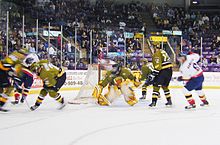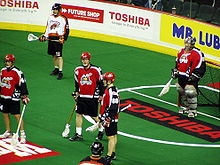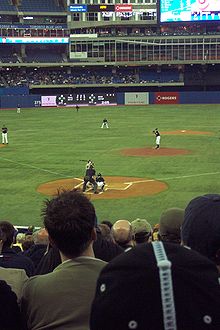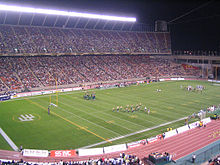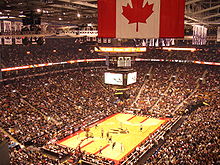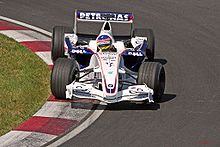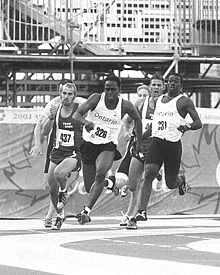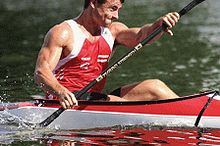- Sports in Canada
-
Culture of Canada
This article is part of a series History Canadians
Canadian identity
Canadian nationalism
Royal symbols
National symbols
Cultural protectionism
Multiculturalism in Canada
Ethnic origins
Immigration
Official bilingualism
Spoken languagesTopics Architecture · Bibliography
Art · Cinema
Cuisine · Festivals · Humour
Literature · Media · Music
Politics · Religion
Sports · Television · TheatrePortal Sports in Canada consists of a variety of games. Although there are many contests that Canada value, the most common are Ice hockey, Lacrosse, Canadian football, basketball, soccer, curling and baseball. All but curling and soccer are considered domestic sports as they were either invented by Canadians or trace their roots to Canada.
Ice hockey, referred to as simply "hockey", is Canada's most prevalent winter sport,[1] its most popular spectator sport, and its most successful sport in international competition. It is Canada's official national winter sport.[1] Lacrosse, a sport with Native American origins, is Canada's oldest and official summer sport.[1] Canadian football is Canada's second most popular spectator sport,[2] and the Canadian Football League's annual championship, the Grey Cup, is the country's largest annual sports event.[3] While other sports have a larger spectator base, association football, known in Canada as soccer in both English and French, has the most registered players of any team sport in Canada.[4] Professional teams exist in many cities in Canada. Other popular team sports include curling, street hockey, cricket, rugby and softball. Popular individual sports include auto racing, boxing, karate, kickboxing, cycling, golf, hiking, horse racing, ice skating, rodeo, skateboarding, skiing, snowboarding, swimming, tennis, triathlon, track and field, water sports, and several forms of wrestling.
As a country with a generally cool climate, Canada has enjoyed greater success at the Winter Olympics than at the Summer Olympics, although significant regional variations in climate allow for a wide variety of both team and individual sports. Major multi-sport events in Canada include the 2010 Winter Olympics. Great achievements in Canadian sports are recognized by Canada's Sports Hall of Fame, while the Lou Marsh Trophy is awarded annually to Canada's top athlete by a panel of journalists. There are numerous other Sports Halls of Fame in Canada.
Contents
Governance
Main article: Sport CanadaFederal and provincial governments are both actively involved in sports each has areas of jurisdiction which overlap sports. Sport Canada generally directs (or at least co-ordinates) federal activity in sports. While the federal government generally tries to take a leadership role in areas of international competition (where its jurisdiction is clearest) some provinces, especially Quebec, are actively involved in sports at all levels, even with elite international athletes. Provinces will often focus on student athletics, as it falls more clearly in an area of provincial jurisdiction (that being education).[5]
University and collegiate sport
Canadian Interuniversity Sport (CIS) is the national governing body for university sports, while the Canadian Colleges Athletic Association governs college sports. A factor which affects athletic participation levels in CIS member institutions is the CIS restriction that scholarships cover tuition only, drawing many of Canada's best student athletes to the United States where organizations such as the National Collegiate Athletic Association (NCAA) allow "full ride" scholarships which include tuition, books, housing, and travel. Another is the popular Canadian Hockey League (for male hockey players aged 15 to 20), which effectively serves as the primary development league for the professional National Hockey League, although CHL teams offer financial support for players who choose to play CIS hockey after leaving the CHL.
Official sports
Since its founding, Canada's official sport was lacrosse. In 1994, First Nations groups objected to a government bill that proposed establishing ice hockey as Canada's national sport, arguing that it neglected recognition of the game of lacrosse, a uniquely Native contribution. In response, the House of Commons amended a bill "to recognize hockey as Canada's Winter Sport and lacrosse as Canada's Summer Sport," although lacrosse is played all year, in all seasons, indoor and outdoors. On May 12, 1994 the National Sports of Canada Act came into force with these designations.[6]
Ice hockey
Main articles: Canada men's national ice hockey team and Canada women's national ice hockey teamA game between the Barrie Colts and Brampton Battalion of the Ontario Hockey League at the Powerade Centre.
The modern form of ice hockey began in Canada in the late 19th century, and is widely considered Canada's national pastime, with high levels of participation by children, men and women at various levels of competition. The Stanley Cup, considered the premiere trophy in professional ice hockey, originated in Canada in 1893. Prominent trophies for national championships in Canada are the Memorial Cup for the top junior-age men's team and the Allan Cup for the top men's senior team. There are national championships in several other divisions of play. Hockey Canada is the sport's official governing body in Canada and is a member of the International Ice Hockey Federation (IIHF). A Canadian national men's team, composed of professionals, competes in the annual IIHF Men's World Championship and in the Olympics.
In terms of spectators, the most popular league is the professional National Hockey League, which has seven teams in Canada: the Calgary Flames, Edmonton Oilers, Montreal Canadiens, Ottawa Senators, Toronto Maple Leafs, Vancouver Canucks, and the Winnipeg Jets. The Canadian NHL presence peaked with eight teams in the mid-1990s, before the Quebec Nordiques relocated to Denver, Colorado in 1995 and a previous incarnation of the Winnipeg Jets relocated to Phoenix, Arizona in 1996. Although Winnipeg did get the jets back in 2011 when the Atlanta Thrashers relocated. The league, founded in Canada, retains a substantial Canadian content as roughly half of its players are Canadian.[citation needed] Hockey Night in Canada is a longtime national Saturday night television broadcast featuring Canadian NHL teams. Junior-age ice hockey is also a popular spectator sport. The junior-age Canadian Hockey League is broadcast nationally and its annual championship is a popular television event. The annual IIHF Men's Junior World Championship, played during December and January, is popular among Canadian television viewers and has been held in Canada numerous times due to its popularity.
Lacrosse
Main article: Lacrosse in CanadaThe First Nations began playing the sport more than 500 years ago. Today lacrosse not only remains an integral part of native culture, but is played by tens of thousands of people across Canada and the north eastern United States. From its origin as 'The Creator's Game' to the overwhelming popularity of the Toronto Rock and the modern game, lacrosse has survived the test of time after treading down a long, controversial path that led it to become recognized as Canada's official national sport.
The Canadian Lacrosse Association, founded in 1925, is the governing body of lacrosse in Canada. It conducts national junior and senior championship tournaments for men and women in both field and box lacrosse. It also participated in the inaugural World Indoor Lacrosse Championship in 2003. The National Lacrosse League is a professional box lacrosse league, with franchises in Canada and the United States. The 2006 World Lacrosse Championship was held in London, Ontario. Canada beat the United States 15-10 in the final to break a 28-year U.S. winning streak. One of the best lacrosse players of all time, Gary Gait was born in Victoria, British Columbia and has won every possible major lacrosse championship. Great achievements in Canadian Lacrosse are recognized by the Canadian Lacrosse Hall of Fame.
Professional sports
Main article: Professional sports in CanadaThere are Canada-based teams in several top-level professional sports leagues.
Baseball
Main article: Professional baseball in CanadaThe world's first documented baseball game took place in Beachville, Ontario on June 4, 1838. Although more strongly associated with the United States, baseball has existed in Canada from the very beginning. The world's oldest baseball park still in operation is Labatt Park in London, Ontario. It is home to the London Majors of the semi-pro Intercounty Baseball League.
The Toronto Blue Jays are Canada's only Major League Baseball team, founded in 1977. The Montreal Expos club played in Montreal from 1969 until 2004 when they moved to Washington, D.C. and became the Washington Nationals. The Blue Jays were the first non-American team to host a World Series Game (in 1992) and the only non-American team to win the World Series (back to back in 1992 and 1993). The Blue Jays had the highest attendance in Major League Baseball during the late 1980s and early 1990s. Professional baseball has a long history in Canada, beginning with teams such as the London Tecumsehs, Montreal Royals, and Toronto Maple Leafs in the late 19th and early 20th centuries. All three were included on the National Baseball Association's top 100 minor league teams.
A number of Canadians have played in the major leagues, and several have won the highest honours in baseball. Ferguson Jenkins won the National League Cy Young Award in 1971 as the best pitcher in the league, and in 1991 became the first Canadian inducted in the (U.S.) Baseball Hall of Fame. Larry Walker was National League MVP for the 1997 season and was the league's batting champion 3 times. Since 2000, Éric Gagné won the National League Cy Young Award in 2003, Jason Bay was the first Canadian to be named rookie of the year in 2004, and Justin Morneau (American League, 2006) and Joey Votto (National League, 2010) have won MVP honours.
Canada participated in the 2006 World Baseball Classic, in which it upset Team USA in first-round play,[7] which some people in Canada call the "Miracle on Dirt" (a play on the phrase "Miracle on Ice" for the 1980 U.S. Olympic Hockey team). There are a number of minor league, semi-professional and collegiate baseball teams in Canada (see List of baseball teams in Canada). Great achievements in Canadian baseball are recognized by the Canadian Baseball Hall of Fame.
Football
Main article: Professional Football in CanadaIn Canada, the term "football" is used to refer to a version of Gridiron football with several significant rule differences from the version played in the USA, hence it is known as Canadian football. The first documented football game was played at University College, University of Toronto on November 9, 1861. One of the participants in the game involving University of Toronto students was (Sir) William Mulock, later Chancellor of the school. A football club was formed at the university soon afterward, although its rules of play at this stage are unclear.[2] In 1864, at Trinity College, Toronto, F. Barlow Cumberland and Frederick A. Bethune devised rules based on rugby football. However, modern Canadian football is widely regarded as having originated with a game of rugby played in Montreal, in 1865, when British Army officers played local civilians.[2] The game gradually gained a following, and the Montreal Football Club was formed in 1868, the first recorded non-university football club in Canada.
Both the Canadian Football League (CFL), the sport's only professional league, and Football Canada, the governing body for amateur play, trace their roots to 1884 and the founding of the Canadian Rugby Football Union. Currently active teams such as the Toronto Argonauts and Hamilton Tiger-Cats have similar longevity. The CFL's championship game, the Grey Cup, is the country's single largest sporting event and is watched by nearly one third of Canadian television households.[3] The eight Canadian football teams are the B.C. Lions, Calgary Stampeders, Edmonton Eskimos, Saskatchewan Roughriders, Winnipeg Blue Bombers, Toronto Argonauts, Hamilton Tiger-Cats, and Montreal Alouettes.
Basketball
Main article: Professional basketball in CanadaBasketball was invented by a Canadian named James Naismith while teaching in Massachusetts. Most of the players in that very first basketball game were students from Quebec. Basketball has been part of Canada's sporting landscape ever since.
The National Basketball Association (NBA) recognizes its first ever game as being a contest between the New York Knickerbockers and Toronto Huskies at Toronto's Maple Leaf Gardens on November 1, 1946.[8] The NBA expanded into Canada in 1995 with the addition of the Toronto Raptors and Vancouver Grizzlies. The Grizzlies moved to Memphis, Tennessee in 2001, but the Raptors continue to draw healthy crowds at the Air Canada Centre. The 2005 and 2006 NBA MVP, Phoenix Suns point guard Steve Nash, is from Victoria, British Columbia and has played in international competitions for Canada's national team.
Five Canadians—two born in the country, two naturalized, and one U.S.-born dual citizen—were on NBA rosters at the end of the 2010–11 season. The Canadian-born players are Joel Anthony and Jamaal Magloire, respectively natives of Montreal and Toronto and both with the Miami Heat. The naturalized Canadians are the South Africa-born Nash and Samuel Dalembert of the Sacramento Kings, born in Haiti and raised in Montreal. The other Canadian is Andy Rautins of the New York Knicks, born in New York as a citizen of both countries, and son of former Canadian NBA player and current men's national team head coach Leo Rautins. Two more Canadian-born players—Brampton native Tristan Thompson and Toronto native Cory Joseph—were selected in the first round of the 2011 NBA Draft, respectively by the Cleveland Cavaliers and San Antonio Spurs.
Amateur sports
Canadian athletes are world-ranked in many amateur sports. These include the 'winter' sports of alpine skiing, cross-country skiing, figure skating, freestyle skiing, snowboarding, speed skating and biathlon. In ice hockey, Canada supports national teams in under-20 and under-18 categories. In 'summer' sports, Canadians participate in rugby, soccer, track and field among most sports presented in the Summer Olympics. There are sports federations for most sports in Canada. Funding for amateur athletics is provided by governments, private companies and individual citizens through donation.
Team sports
Baseball
Main article: Baseball in CanadaBasketball
Main article: Basketball in CanadaBasketball has very strong roots in Canada. The inventor, James Naismith, was Canadian; born in Almonte, Ontario, he was working as a physical education instructor in Massachusetts when he created the game in 1891. As many as 10 of the players in that first game were Canadian students from Quebec.
Basketball is a popular sport in parts of Canada, especially in Nova Scotia, Southern Alberta, and more recently southern Ontario.
The popularity of basketball in Nova Scotia is at the high school and college level. Nova Scotia is home to three perennially strong college basketball programs. Saint Mary's University, Acadia University, and St. Francis Xavier University have made 22, 21, and 13 appearances in the Canadian University championship, respectively. Carleton University has dominated the Canadian University championship in recent years, winning six titles in seven years from 2003 to 2009.
Four Canadian-born individuals have been inducted to the Naismith Memorial Basketball Hall of Fame—Naismith and longtime U.S. college coach and instructor Pete Newell as contributors; Ernie Quigley, who officiated over 1,500 U.S. college games, as a referee; and Bob Houbregs, a superstar at the University of Washington in the early 1950s who went on to a career in the NBA. Newell is also separately recognized by the Hall as the head coach of the 1960 USA Olympic team, which won a gold medal in overwhelming fashion and was inducted as a unit in 2010.
Football
Main article: Canadian footballFootball in Canada has its origins in Rugby football beginning in the early 1860s,[9] but, over time, a unique code known as Canadian football developed. The first documented football match was a game played at University College, University of Toronto on November 9, 1861. A football club was formed at the university soon afterwards, although its rules of play at this stage are unclear.
In 1864, at Trinity College, Toronto, F. Barlow Cumberland and Frederick A. Bethune devised rules based on rugby football. However, modern Canadian football is widely regarded as having originated with a game of rugby played in Montreal, in 1865, when British Army officers played local civilians. The game gradually gained a following, and the Montreal Football Club was formed in 1868, the first recorded non-university football club in Canada.
This rugby-football soon became popular at Montreal's McGill University. McGill challenged Harvard University to a game, in 1874. The game grew in parallel from this point onward in the USA and Canada.
Canadian football is also played at the high school, junior, collegiate, and semi-professional levels: the Canadian Junior Football League and Quebec Junior Football League are for players aged 18–22, many post-secondary institutions compete in Canadian Interuniversity Sport for the Vanier Cup, and senior leagues such as the Alberta Football League have grown in popularity in recent years. Great achievements in Canadian football are recognized by the Canadian Football Hall of Fame which is located in Hamilton, Ontario.
Cricket
Main article: Cricket in CanadaThere are over 40,000 cricketers in the country.[10][11] While Canada is not sanctioned to play Test matches, the team does take part in One Day International (ODI) matches (there are a few grounds in Canada that are sanctioned to host ODI's by the International Cricket Council or ICC) and also in first-class games (in the ICC Intercontinental Cup) against other non-Test-playing opposition, with the rivalry against the United States being as strong in cricket as it is in other team sports. The match between these two nations is in fact the oldest international fixture in cricket, having first been played in 1844. This international fixture even predates the Olympics by over 50 years.
The most famous Canadian cricketer is John Davison, who was born in Canada and participated in the Cricket World Cup in both 2003 and 2007. At the 2003 World Cup, Davison hit the fastest century in tournament history against the West Indies in what was ultimately a losing cause. In that World Cup he also smashed a half-century at a strike rate of almost 200 against New Zealand. One year later, in the ICC Intercontinental Cup against the USA, he proved the difference between the two sides, taking 17 wickets for 137 runs as well as scoring 84 runs of his own. In the 2007 Cricket World Cup in the West Indies, Davison scored the second-fastest half-century against New Zealand. Canada has participated in the 1979, 2003 and 2007 Cricket World Cups.It is set to participate in ICC Cricket World Cup 2011
Canada has traditionally had a strong Women's team. Also The Canadian Under 19 team have competed in the Under 19 World Cup on two occasions. In 2002, they were eliminated in the first round, meaning they competed in the plate competition, in which they did not win a game. They repeated this performance in the 2004 competition.
Canada Senior Men's team qualified in April 2009 at the ICC World Cup qualifier held in South Africa to compete in 2011 World Cup, their third World Cup appearance in a row.[12]
Curling
Main article: Curling in CanadaCurling is most popular in the prairie provinces with the most competitive teams in recent years coming from the province of Alberta and Manitoba. However, curling has a degree of popularity across the country. For example, a team from Quebec, which is not a traditional hotbed of curling, won the Tim Hortons Brier (national men's championship) in 2006. The Scotties Tournament of Hearts is the national women's championship. The Canadian Curling Association is the sport's national governing body; great achievements are recognized by the Canadian Curling Hall of Fame.
Rugby League
Rugby league re-launched in Canada in early 2010 with the Canada national rugby league team taking part in the AMNRL's War at the Shore[13] as well as establishing 2 clubs in the newly formed Canada Rugby League, the 2 being the Toronto City Saints and the St Catharines Bobcats.[14] The Canada Wolverines (The national team of Canada) will be taking part in the Atlantic Cup (rugby league) and the Colonial Cup where they will face the USA Tomahawks and the Jamaica national rugby league team and are aiming to reach the 2013 Rugby League World Cup.[15][16][17]
Rugby Union
Main article: Rugby union in Canada The 2005 Tim Hortons Brier
The 2005 Tim Hortons Brier
Canada has around 13,000 seniors and twice as many junior players spread across the country. Many of these come from Canada's rugby stronghold of British Columbia} while also being strong in Newfoundland and Ontario. The leading domestic competition is the Americas Rugby Championship (ARC), a competition sponsored by the sport's world governing body, the International Rugby Board, in which four regionally-based Canadian teams take part in the opening phase, with the top two teams advancing to a four-team playoff with teams from Argentina and the U.S. When the ARC was established in 2009, the sport's domestic governing body, Rugby Canada, scrapped its previous national competition, the Rugby Canada Super League, in favour of a new national under-20 league, the Rugby Canada National Junior Championship. Also in 2009, Rugby Canada entered into a partnership with the Welsh Rugby Union by which the new Welsh regional side RGC 1404, created to develop the sport in North Wales, would also include a number of young Canadian players.
The Canadian national side have competed in every Rugby World Cup to date yet have only won one match each tournament with the exception of the 1991 tournament where they reached the quarter finals and the 2007 tournament when their best result was a draw against Japan in the group stage.
Highlights include famous victories over Scotland and Wales, and regular wins over their North American neighbours, the United States. Known for their trademark "hard nosed" style of play, many Canadian players ply their trade professionally in English and French leagues.
Soccer
Main article: Soccer in CanadaSoccer's governing body in Canada is the Canadian Soccer Association, which traces its roots to the 1880s. While Canada's women's teams, both at senior level and age-grade, are competitive internationally (finishing fourth place at the 2003 FIFA Women's World Cup, and 2nd place at the 2002 FIFA U-19 Women's World Championship), the national men's team struggles (appeared at one World Cup in 1986 and did not score a goal). At the professional level, the sport has never had major sustained success, with teams coming and going in leagues such as the North American Soccer League (NASL) in the 1970s and 1980s. As of 2011, there are a number of teams in minor leagues such as the CSL, the new NASL, and the USL. As well, Toronto FC is growing in popularity as a team in Major League Soccer, and the Vancouver Whitecaps became Canada's second MLS team in 2011. The new NASL, unlike its namesake a second-level league, launched in 2011 with two Canadian teams—the Montreal Impact and FC Edmonton. The following year, the Impact will join MLS, retaining their name.
While the Whitecaps were playing in the now-defunct USL First Division, they scheduled two friendlies with the L.A. Galaxy of MLS, drawing 0–0 in November 2007 at BC Place and winning 2–1 in May 2008 at Commonwealth Stadium in Edmonton.
Canada hosted the FIFA U-16 World Championship 1987 (predecessor to today's FIFA U-17 World Cup) and 2002 FIFA U-19 Women's World Championship (predecessor to today's FIFA U-20 Women's World Cup), and the 2007 FIFA U-20 World Cup, which was played in the cities of Toronto, Edmonton, Montreal, Ottawa, Victoria and Vancouver. The 2007 U-20 World Cup was the largest FIFA event ever hosted by Canada. The U-20 Women's World Cup will return to Canada in 2014, serving as a warm-up for the country's staging of the 2015 FIFA Women's World Cup.
Great achievements in Canadian soccer are recognized by the Canadian Soccer Hall of Fame.
Individual sports
Motorsport
Main article: Motorsport in CanadaThe Canadian Grand Prix Formula One auto race had been conducted every year since 1967, and since 1978 had been held at the Circuit Gilles Villeneuve in Montreal, apart from 2009 when the race was not on the FIA calendar for one year.[18] The track was named for Canada's first Grand Prix driver, the late Gilles Villeneuve, whose son, Jacques, won the Formula One World championship in 1997.
Several Canadians have starred in American Championship Car Racing, most notably Jacques Villeneuve, who won the 1995 CART championship and Indianapolis 500 before moving to Formula One, and Paul Tracy, who captured the 2003 CART title and collected 31 race wins. Races were held in Mont-Tremblant and Mosport road courses and in street circuits in Toronto, Montreal, Vancouver and Edmonton. In 2008, Champ Car merged with its long-time rival, the Indy Racing League, under the banner of the latter body's top series, the IndyCar Series. The Edmonton was transferred over to the new series immediately, and the Toronto event was added for 2009.
CASCAR (the Canadian Association for Stock Car Auto Racing) was the country's governing body for amateur and professional stock car racing, and the CASCAR Super Series was the highest-level stock car racing series in the country. In 2006, NASCAR purchased CASCAR and rebranded the Super Series as the NASCAR Canadian Tire Series; nevertheless, the series remains Canada's top-level stock car racing circuit. In 2007 the Castrol Canadian Touring Car Championship was formed.
Because Canada is NASCAR's largest market outside the United States, NASCAR brought the NAPA Auto Parts 200 Busch Series (now Nationwide Series) race to Circuit Gilles Villeneuve in 2007;[19] the race has continued on the schedule ever since.
Canadians have combined to win 53 races in American Championship Car Racing (Including 1 Indianapolis 500), 17 races in Formula 1 and 7 races in NASCAR's top 3 divisions (1 in Sprint Cup).
Bowling
Main articles: Bowling in Canada and Five-pin bowlingThe sport of bowling takes several forms in Canada, including ten-pin and lawn bowling, but most notably Canada has its own version: Five-pin bowling, which was invented in Toronto. It was devised around 1909 by Thomas F. Ryan in Toronto, Ontario, at his Toronto Bowling Club, in response to customers who complained that the ten-pin game was too strenuous. He cut five tenpins down to about 75% of their size, and used hand-sized hard rubber balls, thus inventing the original version of five-pin bowling.[20] Five-pin is played in all parts of Canada, but not played in any other country. A unique ten-pin bowling game using a small bowling ball is played in Nova Scotia.
Golf
Main article: Golf in CanadaGolf is a widely-enjoyed recreational sport in Canada, and the country boasts several highly-rated courses. Golf Canada, historically the Royal Canadian Golf Association, is the governing organization, and has over 1,600 associated member clubs and over 300,000 individual members.[21] Golf Canada also conducts the only PGA Tour and LPGA tour events in Canada, and it also manages the Canadian Golf Hall of Fame. The Canadian Professional Golf Tour, once known as the "Peter Jackson Tour" is an organization that runs a series of tournaments for professional players, some of which are conducted outside Canada.
Ontario's Mike Weir won the 2003 Masters, becoming the first Canadian man to win one of golf's majors. The first Canadian to win any recognized major championship was Sandra Post, winner of the LPGA Championship in 1968. From 1979 through 2000, the du Maurier Classic (now known as the Canadian Women's Open) was one of the LPGA's four majors.
Cycling
Main article: Cycling in CanadaBiking has increased its participation in the past few years. Several new genres of the sport have become popular in Canada, including slopestyle competition, four cross, downhill racing, dirt jumping, and free-ride. With the sport increasing bikes have also increased in quality and durability.
Wrestling
Wrestling in Canada is very popular both as a recreational and as a competitive sport, and takes a variety of forms, reflecting Canada's diverse and multicultural makeup. At the middle, high school and collegiate level there is a broad-based varsity participation in Freestyle Wrestling and Greco-Roman Wrestling. Outside of schools among the general population, the dominant forms of wrestling are Judo, Submission Grappling, Brazilian Jiu-jitsu and Sambo. Each of these forms of wrestling was brought to Canada from abroad both by coaches who immigrated to Canada from elsewhere and by students of the sport who studied it overseas and carried enthusiasm for the sport back with them when they returned. Examples of famous Canadian wrestlers among these various wrestling sports are such as Daniel Igali for Freestyle Wrestling, Nicolas Gill, Ron Angus and Keith Morgan for Judo, Marc Bocek for both Submission Grappling and Brazilian Jiu-jitsu. Canada has a strong showing on the international scene, at world championships and at the Olympics in all these wrestling sports.
Mixed martial arts
MMA is a young and growing sport in Canada,[citation needed] which has produced several notable fighters in the UFC and other promotions. Canada is the home of the current UFC Welterweight Champion Georges St-Pierre.
Multi-sport events
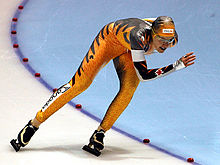 Clara Hughes, multiple medallist at both the Summer and Winter Olympics.
Clara Hughes, multiple medallist at both the Summer and Winter Olympics.
Major multi-sport events with Canadian participation, or that have taken place in Canada, are the Olympic Games, Commonwealth Games, Canada Games, Word Championships in Athletics, Pan American Games, and the Universiade. Others include the North American Indigenous Games, the World Police and Fire Games, and the Gay Games.
Canada Games
Main article: Canada GamesThe Canada Games is a high-level multi-sport event with held every two years in Canada, alternating between the Canada Winter Games and the Canada Summer Games. Athletes are strictly amateur only, and represent their province or territory. Since their inception, the Canada Games have played a prominent role in developing some of Canada's premier athletes, including Lennox Lewis, Catriona LeMay Doan, Hayley Wickenheiser, Sidney Crosby, Martin Brodeur, Steve Nash, Suzanne Gaudet and David Ling. The Games were first held in 1967 in Quebec City as part of Canada's Centennial celebrations. Similar events are held on the provincial level, such as the annual BC Games.
Commonwealth Games
Main article: Canada at the Commonwealth GamesCanada is one of only six nations to have attended every Commonwealth Games, and hosted the first ever British Empire Games in 1930 in Hamilton, Ontario. Canada also hosted the 1954 British Empire and Commonwealth Games in Vancouver, British Columbia, the 1978 Commonwealth Games in Edmonton, Alberta, and the 1994 Commonwealth Games in Victoria, British Columbia. Canada ranks third in the all-time medal tally of Commonwealth Games. Halifax, Nova Scotia had been nominated as Canada's selection to host the 2014 Commonwealth Games before it withdrew its bid due to unacceptably high cost projections.
Olympic Games
Main articles: Canada at the Olympics, Canada at the Summer Olympics, and Canada at the Winter OlympicsCanada has competed at every Olympic Games, except for the first games in 1896 and the boycotted games in 1980. Canada has previously hosted the games three times, at the 1976 Summer Olympics in Montreal, the 1988 Winter Olympics in Calgary, and the 2010 Winter Olympics in Vancouver.
At the summer games, the majority of Canada's medals come from the sports of athletics, aquatics (swimming, synchronized swimming and diving), rowing and canoeing/kayaking. In the post-boycott era (since 1988), Canada's medal total ranks 19th in the world, with the highest rank of 11th in 1992 and the lowest of 24th in 2000.
At the winter games, Canada is usually one of the top nations in terms of medals won. Canada is traditionally strong in the sports of ice hockey, speed skating (especially the short track variation), figure skating and every Canadian men's and women's curling teams have won medals since the sport was added to the Olympic program.
After Canada failed to win any gold medals at the 1976 Summer and 1988 Winter games, several organizations including Sport Canada and the Canadian Olympic Committee collaborated to launch "Own the Podium – 2010", a development program to help Canada earn the most medals at the 2010 Games. Canada did not win the most total medals at the Vancouver Olympics (they finished third, behind the United States, whose 37 total medals was the most of any country at a single Winter Olympics, and Germany, with 26), but did win the most gold medals, with 14, the most of any country at a single Winter Olympics.
The National Sport School in Calgary, founded 1994, is the first Canadian high school designed exclusively for Olympic-calibre athletes.
Other events sanctioned by the IOC
Paralympics
Main article: Canada at the ParalympicsYouth Olympics
Main article: Canada at the Youth OlympicsDeaflympics
Main article: Canada at the DeaflympicsOther International Competitions
Pan American Games
Main article: Canada at the Pan American GamesCanada has participated in each of the Pan American Games since the second edition of the games, held in Mexico City in 1955. The fifth games took place in Winnipeg in 1967, Canada's Centennial year. Winnipeg hosted again in 1999. Toronto has been selected as the host city for the 2015 games, which will be held in July, 2015 in venues located in Toronto and its surrounding municipalities.[22]
Jeux de la Francophonie
Main article: Canada at les Jeux de la FrancophonieGoodwill Games
Main article: Canada at the Goodwill GamesUniversiade
Main article: Canada at the UniversiadeNorth American Indigenous Games
Main article: Canada at the North American Indigenous GamesWorld Police and Fire Games
Main article: Canada at the World Police and Fire GamesArctic Winter Games
Main article: Canada at the Arctic Winter GamesMedia
Main article: Sports media in CanadaMajor television broadcasters of sports in Canada include the CBC Television, Télévision de Radio-Canada, The Sports Network (TSN), Réseau des sports (RDS), Rogers Sportsnet, and The Score. A consortium led by CTVglobemedia outbid CBC for the broadcast rights to the 2010 Winter Olympics and 2012 Summer Olympics. Major national weekly sports broadcasts include Hockey Night In Canada and Friday Night Football. There are sports radio stations in most major Canadian cities as well as on satellite radio.
Sports Rankings
Sport Men's Women's Baseball (IBAF World Rankings) 7 3 Basketball (FIBA World Rankings) 23 12 Cricket (World Cricket League) 16 - Curling (WCF World Rankings) 1 2 Soccer (FIFA World Rankings
and FIFA Women's World Rankings)73 6 Ice hockey (IIHF World Ranking) 2 2 Rugby union (IRB World Rankings) 15 - Tennis (ITF Rankings) 37 15 Volleyball (FIVB World Rankings) 20 24 References
- ^ a b c "National Sports of Canada Act (1994)". Consolidated Statutes and Regulations. Department of Justice. http://lois.justice.gc.ca/en/N-16.7/251603.html. Retrieved 2006-07-20.
- ^ Canadian Press (June 8, 2006). "Survey: Canadian interest in pro football is on the rise". Globe and Mail. http://www.theglobeandmail.com/servlet/story/RTGAM.20060608.wsurvey8/BNStory/Sports/home. Retrieved June 8, 2006.
- ^ a b William Houston (December 20, 2006). "Grey Cup moves to TSN in new deal". The Globe And Mail. http://www.theglobeandmail.com/servlet/story/RTGAM.20061220.wsptcfl20/GSStory/GlobeSportsFootball/GlobeSports/?query=. Retrieved 2006-12-23.[dead link]
- ^ "Canada's hockey obsession leading to burnout among young players". Canada.com. September 16, 2008. http://www.canada.com/reginaleaderpost/news/sports/story.html?id=150b0ecd-fb4a-4cff-9ff0-24c5c17c1c52.
- ^ 'Taking Sports Seriously' 3rd edition Thompson Educational Publishing
- ^ [National Sports of Canada Act http://www.canlii.org/en/ca/laws/stat/sc-1994-c-16/latest/sc-1994-c-16.html]
- ^ "ESPN - U.S. rallies, but can't overcome 8-0 hole vs. Canada - MLB". Sports.espn.go.com. 2006-03-09. http://sports.espn.go.com/mlb/worldclassic2006/news/story?page=260310901_WBC_06. Retrieved 2011-02-25.
- ^ Goldpaper, Sam. "The First Game". http://www.nba.com/history/firstgame_feature.html. Retrieved 2009-05-10.
- ^ "Canadian Football Timelines (1860 – present)". Football Canada. Archived from the original on 2007-02-28. http://web.archive.org/web/20070228064050/http://www.footballcanada.com/history_timeline.asp. Retrieved 2006-12-23.
- ^ "Archive | Your Source of News on the World Wide Web". Dawn.Com. http://www.dawn.com/2008/06/22/spt18.htm. Retrieved 2011-02-21.
- ^ "This page is available to GlobePlus subscribers". Theglobeandmail.com. http://www.theglobeandmail.com/servlet/story/RTGAM.20080621.wcricket21/BNStory/National/?page=rss&id=RTGAM.20080621.wcricket21. Retrieved 2011-02-21.
- ^ "ICC President congratulates four qualifiers for ICC Cricket World Cup 2011". Iccworldcupqualifier.yahoo.net. 2009-04-20. http://iccworldcupqualifier.yahoo.net/news/news20090420-49.html. Retrieved 2011-02-25.
- ^ "War at the Shore match reports". Canadarugbyleague.com. http://www.canadarugbyleague.com/news/article.php?id=10051. Retrieved 2011-02-21.
- ^ "Saints to take on Bobcats this Saturday". Canadarugbyleague.com. http://www.canadarugbyleague.com/news/article.php?id=10056. Retrieved 2011-02-21.
- ^ "Wolverines to take part in Atlantic Cup". Canadarugbyleague.com. http://www.canadarugbyleague.com/news/article.php?id=10054. Retrieved 2011-02-21.
- ^ "It's official - Canada v USA : September 19 in Kingston". Canadarugbyleague.com. http://www.canadarugbyleague.com/news/article.php?id=10052. Retrieved 2011-02-21.
- ^ "RLIF to look at adding Atlantic Qualifier for 2013 World Cup". Canadarugbyleague.com. http://www.canadarugbyleague.com/news/article.php?id=10062. Retrieved 2011-02-21.
- ^ "FIA issue revised 2009 calendar". http://www.formula1.com/news/headlines/2008/10/8483.html. Retrieved 2008-10-07.
- ^ "Nascar.Com". Nascar.Com. 2011-02-19. http://www.nascar.com/races/bg/2007/data/schedule.html. Retrieved 2011-02-25.
- ^ "C5PBA". C5pba.ca. 1962-11-19. http://www.c5pba.ca/index.php?page=about&sub=history&lang=en. Retrieved 2011-02-25.
- ^ "About Us". Golf Canada. http://www.golfcanada.ca/about-us/. Retrieved May 22, 2011.
- ^ "How a Toronto Pan Am Games would look". Network.nationalpost.com. http://network.nationalpost.com/np/blogs/toronto/archive/2009/02/18/how-a-toronto-pan-am-games-would-look.aspx. Retrieved 2011-02-25.
Further reading
- Beers, William George (1869), Lacrosse: the national game of Canada, Dawson Brothers, http://books.google.ca/books?id=J8E9AAAAYAAJ&dq=Lacrosse&pg=PP5#v=onepage&q&f=true
- Culin, Stewart (1975). Games of the North American Indians. Courier Dover Publications. pp. 846 pages. ISBN 0486231259. http://books.google.ca/books?id=val_gaufljwC&lpg=PP1&dq=Games%20of%20the%20North%20American%20Indians&pg=PP1#v=onepage&q&f=true.
- Hall, M. Ann (2002), The girl and the game : a history of women's sport in Canada, Broadview Press ISBN 155111268X
- Hart, Cantelon; Jean Harvey (1988), Not just a game: essays in Canadian sport sociology, University of Ottawa Press, ISBN 0776601156, http://books.google.ca/books?id=Mhk45XnUIvgC&lpg=PA213&dq=Canadian%20sports&pg=PP1#v=onepage&q&f=true
- Mooney, Maggie (2010), Canada's Top 100: The Greatest Athletes of All Time, Greystone Books, ISBN 9781553655572, http://books.google.ca/books?id=6jE2mJOgzvQC&lpg=PA133&dq=sports%20in%20Canada&pg=PP1#v=onepage&q&f=true
- O'Brien, Steve (2005), The Canadian Football League: The Phoenix of Professional Sports Leagues, Lulu Press, ISBN 1411658604, http://books.google.ca/books?id=hUCto5BNvwsC&lpg=PP1&dq=Canadian%20Football%20League&pg=PP1#v=onepage&q&f=true
- Podnieks, Andrew (2006), A Canadian Saturday Night: Hockey and the Culture of a Country, Greystone Books, ISBN 9781553652014, http://books.google.ca/books?id=qnVpwcFbNWQC&lpg=PP1&dq=Canadian%20Culture&pg=PP1#v=onepage&q&f=true
- Zawadzki, Edward (2004), The Ultimate Canadian Sports Trivia Book, Volume 2, Dundurn Group, ISBN 1550025295, http://books.google.ca/books?id=0jV_tdolWAcC&lpg=PA54&dq=Canadian%20sports%20personalities&pg=PP1#v=onepage&q&f=true
- Wieting, Stephen G (2001). Sport and memory in North America. Frank Cass. ISBN 0-7146-8205-5. http://books.google.ca/books?id=dvWqyW9lmXsC&lpg=PP1&dq=Sport%20and%20memory%20in%20North%20America&pg=PP1#v=onepage&q&f=true.
External links
 Links related to Sports in Canada
Links related to Sports in Canada Sport in Canada
Sport in CanadaMain articles Sport in Canada • Professional sport in Canada • Baseball in Canada • Canadian football
Cricket in Canada • Rugby league in Canada • Rugby union in Canada • Soccer in Canada • Volleyball in Canada • Canada GamesSignificant figures Canada at the.. Olympics • Summer Olympics • Winter Olympics • Paralympics • Commonwealth Games • Pan Am Games • Special OlympicsSummer Olympics stats Winter Olympics stats Paralympics stats (host nation) Commonwealth Games stats National sports teams A1GP • Australian football • Bandy • Badminton • Baseball • Basketball (men - women) • Cricket (men – women) • Field hockey (men – women) • Floorball (men - men's U-19 - women) • Football • Ice hockey (men – men's U-20 – women • women's U-18) • Ice sledge hockey • Inline hockey • Soccer (men – men's youth – women) • Softball (men - women) • Tennis (Davis Cup - Fed Cup) • Volleyball (men – women) • Water polo (men – women) • Rugby Rugby league • Rugby union (sevens)Ice hockey Football Baseball Teams... Active Baseball teams • Defunct baseball teamsOther sports Teams... Basketball • Lacrosse • Soccer
Tournaments... Golf • Motorsport • Tennis • Cycle • Soccer • Horse races • CurlingGoverning bodies Sport Canada • Secretary of State (Sport) • Karate Canada • Hockey Canada (Canadian Hockey League) • Equine Canada • Canadian Interuniversity Sport
Baseball Canada • Alpine Canada • Athletics Canada • Canadian Cycling Association • Canadian Lacrosse Association
Skate Canada (governing body) (Speed Skating Canada) • Canadian Soccer Association • Cricket Canada • Canada Rugby LeagueRelated National A1GP • Australian football • Bandy • Badminton • Baseball (M – W) • Basketball (M – W) • Beach soccer • Cricket (M – W) • Field hockey (M – W) • Floorball (M – M-U19 – W) • Football • Ice hockey (M – M-U20 – M-U18 – W – W-U18) • Ice sledge hockey • Inline hockey • Netball • Lacrosse (M – M-U19 – Indoor – W – W-U19) • Rugby league • Rugby union (M - M-U20 – M7 - W) • Soccer (M – M-U20 – M-U17 – W – W-U20 – W-U17) • Softball (M – W) • Tennis (Davis Cup – Fed Cup) • Volleyball (M – W) • Water polo (M – W) • Olympics (Summer – Winter) • Paralympics (Summer – Winter) • Commonwealth Games • Pan Am Games See also: The Sports of Canada portal Lists of sports teams in Canada
Lists of sports teams in CanadaIce hockey by province Baseball Other sports Sports in North America Sovereign states Antigua and Barbuda · Bahamas · Barbados · Belize · Canada · Costa Rica · Cuba · Dominica · Dominican Republic · El Salvador · Grenada · Guatemala · Haiti · Honduras · Jamaica · Mexico · Nicaragua · Panama · Saint Kitts and Nevis · Saint Lucia · Saint Vincent and the Grenadines · Trinidad and Tobago · United States

Dependencies and other territories Anguilla · Aruba · Bermuda · British Virgin Islands · Cayman Islands · Greenland · Guadeloupe · Martinique · Montserrat · Navassa Island · Netherlands Antilles · Puerto Rico · Saint Barthélemy · Saint Martin · Saint Pierre and Miquelon · Turks and Caicos Islands · U.S. Virgin Islands
Categories:- Lists of sports teams in Canada
- Sport in Canada
Wikimedia Foundation. 2010.


